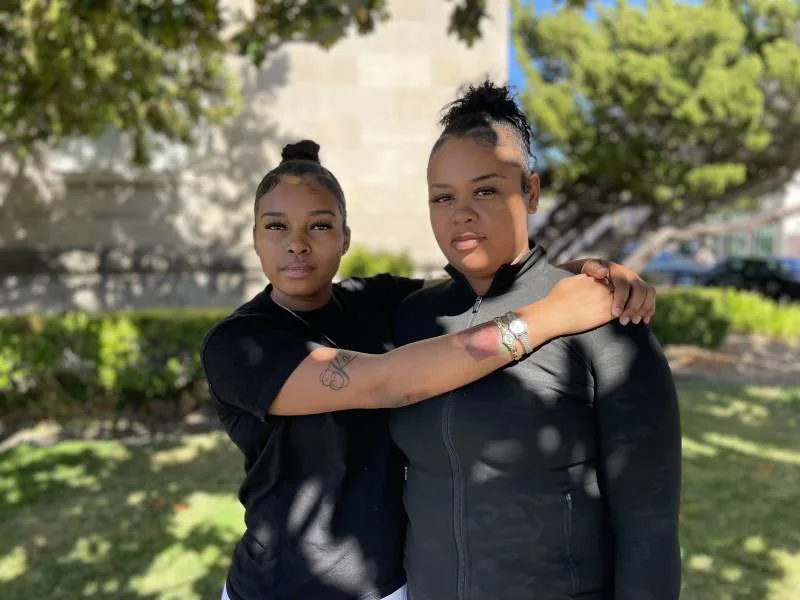As a member of the county’s Alternate Defender Office, Kuluk was assigned to represent Windom, now 24, who was pursuing a music career at the time of his arrest.
Kuluk and Windom requested charging records from Contra Costa County District Attorney Diana Becton. With the help of a UC Irvine statistician, they found that from 2015–2022, Black men accused of gang-related murders were 44% more likely to be charged with enhancements than defendants of other races accused of similar gang-related murders.
“Because they carry mandatory LWOP, the filing of special circumstances is an assertion that an individual is irredeemable,” Kuluk told KQED, referring to a life without the possibility of parole sentence. “It is beyond unfair and unacceptable for the government to more frequently deem Black people unworthy to ever get the opportunity to prove their redemption to a parole board.”
Becton’s office disputed Kuluk’s findings, but in May, Windom and his co-defendants convinced the court that the district attorney had applied the enhancement in a biased way. The gang enhancement was dismissed. It was the first time in the United States, a country where Black residents are five times more likely to be incarcerated in state prison than white residents, that an argument of implicit bias in the justice system resulted in a charge being dropped from a criminal case.
Contra Costa Chief Assistant District Attorney Simon O’Connell said he doubted anyone in the office was knowingly targeting Black defendants for harsher punishment. But he said the RJA challenge gave the DA a reason to look more closely at their charging data.
“We don’t know what we don’t know,” he said. “It was important for us to start looking at historical data to see if, in fact, there were implicit biases and trends in our data, which would be surprising to us.”
The police
Windom and his three co-defendants had a second RJA hearing related to racist text messages uncovered by an FBI probe into alleged criminal activity by the Antioch and Pittsburg police departments.
Some of the messages were sent during the murder investigation. Here’s one exchange sent over the course of 22 minutes while officers were surveilling McGee, Allen, Pugh and Windom eating at a barbecue restaurant in Concord in March 2021:
Antioch police officer Eric Rombough: “Sooo many black peolpe (sic).”
Antioch police officer Jonathan Adams: “Bro. They all look the same.”
Rombough: “Tell me about it. I feel like I’m at the zoo.”
Rombough: “They’re getting ice cream. Swarming to it like Hennessy. I bet its chicken.”
Adams: “Could be ribs.”
Rombough: “For sure watermelon and kool aid. I hate these idiots.”
Other messages suggest Black people don’t like pools and can’t be seen in the dark, employing tropes used to demean Black people. Still, other messages use the N-word and include photos of Pugh and Allen in hospital beds after being injured by officers during their arrests. In the messages, the officers joke about kicking Allen’s head like a football.
Shirelle Cobbs, Allen’s mother, shook with rage outside of the courtroom after the texts were read during a hearing. “If it was the other way around, my son would be under the courthouse or dead,” she said.
Becton has recommended at least 30 criminal cases for dismissal that involve police work by officers involved in the text messaging exchanges. But not in this case.
In the second RJA claim, the men asked Goldstein to dismiss all the enhancements and to downgrade a number of the top charges. They argued that the racist text messages made it impossible for the investigating officers to have done their jobs free of bias. They argued that not only were the officers who sent the messages compromised but so was the entire police department.
In August, Claire Jean Kim, a UC Irvine political science professor and expert in racial bias, testified for the defense. The text messages included department supervisors. She said only in a department with an entrenched culture of racism would no one report the violations of department policy. And that, she said, is exactly what happened in the Antioch Police Department.
“The law can and must repudiate the decisions made by such decision-makers, both for the sake of the defendant and for the community that rests its trust in the justice system,” she told the court.

Vienna Peterson Joiner was frequently in the gallery watching Windom, her son, closely. She told KQED she was trying to decipher how he was feeling and whether he’d eaten by the way he sat in his chair. Peterson Joiner and Windom are not allowed to speak at his court appearances.
“I want to run up there and hug him,” she said. “I want to tell [the court] what we know about Eric.”
She drove to Martinez from Los Angeles for court dates, sometimes stopping to pick up her son’s fiance, Mariah Thomas, and their 1-year-old daughter. When Windom was a toddler, his father was incarcerated.
“His own experience with his father and his current situation and lack of ability to be fully there for his child now is weighing on him,” Kuluk told KQED.
For Thomas, the disruption to building a family with Windom is painful.
“He’s being held by people who don’t like the color of his skin,” she said. “That’s really what it boils down to because if these people were white, they would’ve been home. They would’ve been with their family.”
Peterson Joiner said it was a relief when the judge dropped the gang enhancement.
“I was glad that the judge did see that and paid attention to what was actually really going on,” she said. “People think that just because slavery ended, racism was pulled out at the root. But it wasn’t.”
Data is the mechanism
Natasha Minsker, a criminal justice reform policy consultant, said Becton’s willingness to provide data on charging practices has made the county a hot spot for attorneys testing the limits of the RJA using statistical evidence of discriminatory treatment. She, like Kuluk, is a member of the Racial Justice Act Implementation Working Group, a collection of advocates, attorneys and policymakers moving to bring claims.
As of Jan. 1, people who are currently and formerly incarcerated are now able to challenge their convictions using the RJA. Minsker said more than three-quarters of the state’s prison population — about 90,000 people — could have viable claims. If implemented, she said, the law could help end mass incarceration in California.
But to get there, defense attorneys need more funding and more data.
“They were incredibly cooperative,” Kuluk said of Becton’s office. “That’s not what has been happening in many other counties in California where DA’s offices have been hostile to public records requests that they interpret as potentially leading to Racial Justice Act claims.”
Cities and counties aren’t currently required to collect data on the race of defendants or to make that data public. According to a statewide survey conducted by the reparations task force, 12 out of 57 responding county DA offices, including Sacramento, do not collect data on an accused person’s race, making RJA claims extremely challenging, if not impossible.
Solano County, home to the Vallejo Police Department, did not respond to the survey. In October, the state Department of Justice expanded oversight of the Vallejo police after the department failed to comply with the vast majority of court-mandated reforms.
“Without access to data, the promise of the [Racial Justice] Act has the potential to ring hollow to many,” the task force wrote in its report.


